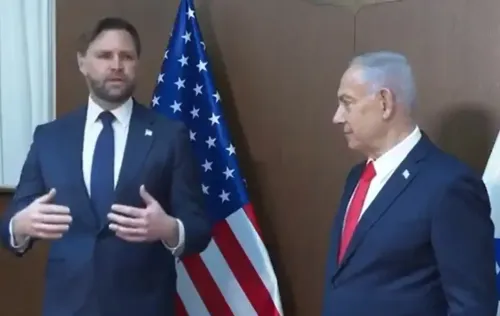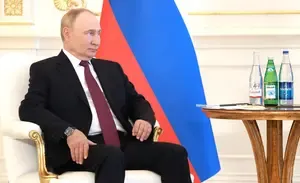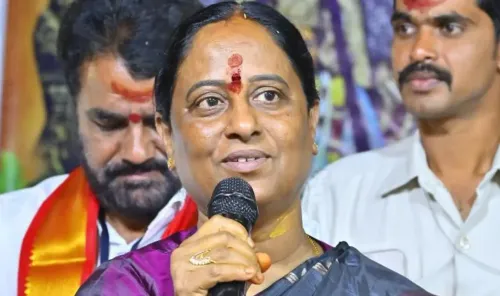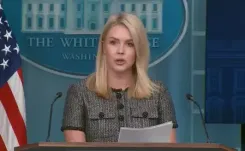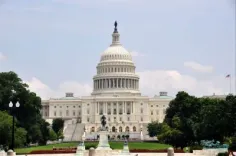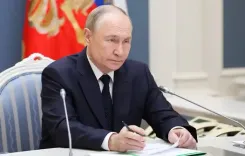PM Modi Leads 4th National Chief Secretaries Conference in Delhi
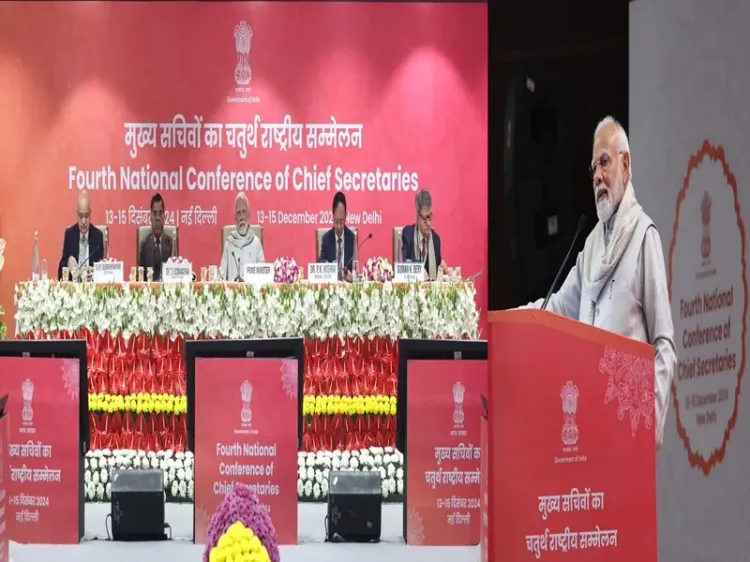
New Delhi, Dec 15 (NationPress) Prime Minister Narendra Modi convened the 4th National Conference of Chief Secretaries in the capital on Sunday, where he noted that Pro-People Pro-active Good Governance (P2G2) is central to our objectives, enabling us to realize the vision of Viksit Bharat.
In a post on X, PM Modi stated: "Participated in the Chief Secretaries Conference, an essential platform for collaboration between the Centre and states aimed at enhancing governance. The discussions concentrated on promoting growth, ensuring effective governance, and improving service delivery to citizens. We also emphasized how to enhance infrastructure and utilize technology for superior governance."
The three-day Conference took place in Delhi from December 13-15.
PM Modi remarked that the primary advantage of this Conference was the unity of Team India in open discussions aimed at working collaboratively towards a Viksit Bharat.
Topics covered included the key theme of ‘Promoting Entrepreneurship, Employment, and Skilling – Leveraging the Demographic Dividend’.
The PMO, in a statement, indicated that the Prime Minister lauded the rise of Start-ups, particularly in Tier 2/3 cities. He encouraged states to foster such innovations and create an environment conducive to start-up growth.
PM Modi urged states to pinpoint locations in smaller cities favorable for entrepreneurs and take steps to connect them with the banking sector, provide logistics, and support them.
The Prime Minister also called upon states to streamline compliance processes that often frustrate citizens. He encouraged participants to reform governance models to bolster citizen engagement or Jan Bhagidari.
He further emphasized the significance of reform, perform, and transform, along with the necessity of informing the populace about the government's various initiatives.
Regarding the Circular Economy, the Prime Minister acknowledged the GOBARdhan program as a significant energy resource, noting that it transforms waste into wealth while turning aged cattle into assets instead of liabilities, as per the PMO release.
PM Modi directed states to consider concepts like Viability Gap Funding for recycling E-waste, which is crucial as our data-driven society generates increasing digital waste. Transforming this e-waste into a valuable resource will reduce our reliance on importing such materials.
In health, PM Modi highlighted that under the Fit India Movement, obesity should be recognized as a major challenge for Bharat. He asserted that only a fit and healthy India can become a Viksit Bharat. He also expressed that Bharat could become 'TB-free' by the end of 2025, emphasizing the crucial role of ASHA and Anganwadi workers in achieving this goal.
The Prime Minister pointed out that old manuscripts are a treasure of Bharat and stressed the need for technology to digitize them, urging states to take action in this regard. While he appreciated that PM GatiShakti has been a significant catalyst for good governance, he also stated that it must be regularly updated to include indicators for environmental impacts and disaster-prone areas.
On the Aspirational Districts and Blocks Programme, PM Modi remarked that capable officers in these districts could drive substantial changes on the ground, leading to vast socio-economic benefits.
Regarding urban development, PM Modi strongly advocated for the enhancement of human resources to transform cities into economic growth centers. He stressed the importance of developing specialized institutions for urban governance, water management, and environmental stewardship. With rising urban mobility, he also highlighted the necessity for adequate urban housing, which would enhance productivity in the manufacturing sector within new industrial hubs.
The Prime Minister also paid tribute to Sardar Vallabhbhai Patel, describing him as an inspiration for civil servants. Noting that today marks his death anniversary and this year celebrates his 150th birth anniversary, PM Modi suggested that the next two years should be commemorated with efforts towards realizing Patel's vision for India.
To engage every Indian in the journey towards Viksit Bharat, he urged them to emulate the spirit of the freedom movement, where people from diverse backgrounds and circumstances united for a common cause. He emphasized that just as the freedom struggle saw participation from all walks of life, every Indian must contribute to the goal of a Viksit Bharat by 2047.
Reflecting on India's independence occurring 25 years after the Dandi March, the Prime Minister stated that if we resolve to become a Viksit Bharat by 2047, we will undoubtedly achieve it.
The three-day Conference highlighted special themes including Manufacturing, Services, Rural Non-farm, Urban, Renewable Energy, and Circular Economy.
Attendees included Chief Secretaries, senior officials from all states and Union Territories, domain experts, and senior officers from the Centre.

